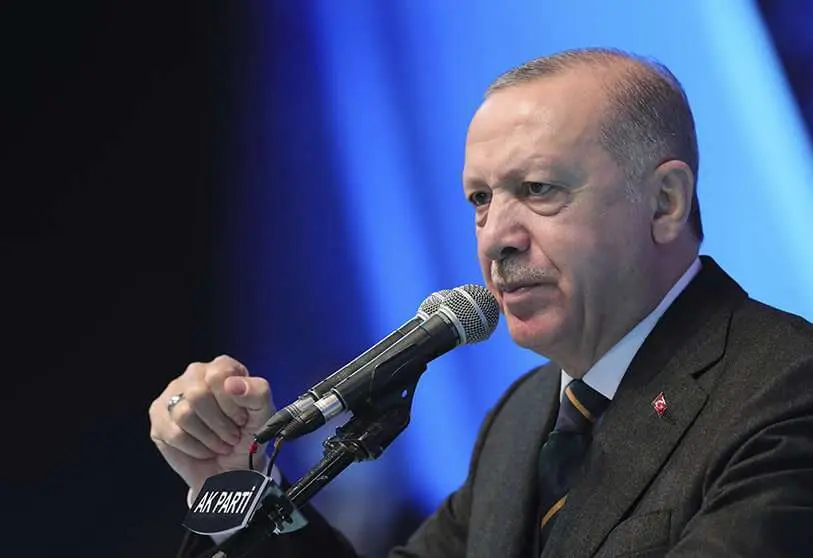Turkish lira hits a new all-time low

The Turkish lira hit a new all-time low on Wednesday. The fall was preceded by President Erdogan's remarks announcing a further interest rate cut by the Turkish central bank. The currency weakened 3 per cent to 8.88 lira to the dollar, but then stabilised to trade around 8.59 lira to the dollar at the close of trading.
"It is imperative that we lower interest rates. For that, we will get to July and August or so for rates to start coming down," Erdogan revealed to TRT broadcaster on Tuesday. "If we take the burden of interest rates off investments and prices, then we will enter a calmer atmosphere, because it is interest rates that cause price inflation," he added.
The president's remarks made the markets nervous and caused the currency to weaken. The sudden change in the exchange rates of the lira, one of the worst performing currencies in emerging markets, was a direct reaction to Erdogan's latest statements. Moreover, his latest economic decisions have worried investors, who denounce the central bank's lack of independence.
Erdogan acknowledged that he had been in contact with the head of the Central Bank, Şahap Kavcıoğlu, to discuss the issue. However, Kavcıoğlu himself conveyed to investors after the fall that talks of an early easing of interest rates were "meaningless" and that inflation would calm down in the third or fourth quarter of this year, all with the aim of mitigating the new setback to the Ottoman economy.

The traditional stance on banks raising interest rates argues that they lead to lower inflation, as people would be less willing to borrow. Experts also agree that Turkey should keep rates high to prevent prices from getting out of control, especially after inflation has been stagnating in the double digits for more than three years.
However, the Turkish president argues that higher interest rates would lead to higher inflation. According to this version, any rate cut would lower production costs and push down consumer prices. Although premature rate cuts in the past have resulted in a weakening of the lira, leading to higher consumer prices and forcing the authorities to deploy significant rate hikes.
In any case, the lira has lost 16 per cent of its value since March, when Erdogan sacked the then head of the central bank, Naci Ağbal, the fourth head of the institution in two years. The new fall has set off alarm bells in a country facing a severe economic crisis. The consequences generated by the pandemic, plus the weakness of the lira, have increased Turkey's vulnerability to external factors.

The country has 34.5 million people in debt through banks, and another 2.3 million Turks took out loans for the first time last year, according to official statistics. In addition, imports and commodities have become more expensive. Today, one lira is equivalent to 0.12 dollars.
The Ottoman authorities will release updated inflation data on Thursday. Inflation rose 17.3 per cent year-on-year in May from 17.1 per cent the previous month, according to the estimate published by Bloomberg. This would be a further acceleration for the eighth consecutive month, which is why Turkey's central bank has been in talks with foreign investors and experts to inject credibility into the country's economic outlook.

The Justice and Development Party, the president's political party, lost local elections two years ago in most municipalities with double-digit unemployment, including the largest city, Istanbul, and the country's capital, Ankara. For this reason, reducing the unemployment rate is one of the Turkish government's priorities if it wants to maintain the support of the street.
Unemployment stands at 13.1%, and the rate among the country's youth is close to double. The main problem, however, is inflation. The official target is to bring it down to 5%, but the current record is three times that target. This has been the main reason behind Erdogan's decision to replace four central bank governors in two years, but the current scenario makes it impossible for Kavcıoğlu to embark on an easing cycle.
His predecessor, Naci Ağbal, a prestigious and market-friendly figure, was removed in March after raising interest rates in response to global markets. Investors then interpreted the decision to oust Ağbal as a sign of his intention to take control of monetary policy and pursue his plan to lower rates in the face of high inflation.
Against all odds, the arrival of Kavcıoğlu has not brought about major changes. The current head of Turkey's central bank, who is seen as Erdogan's puppet, has resisted the president's pressure and kept interest rates stable at 19 per cent, where Ağbal himself had set them.









